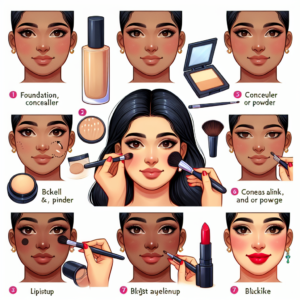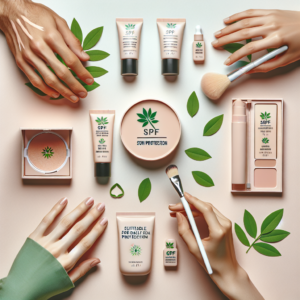
Key Takeaways
- UV protection in makeup is essential for daily skin health and can prevent long-term damage.
- Understanding SPF is crucial to selecting the right products for your skin type and exposure.
- Beauty By Earth offers a range of products that combine cosmetics with sun care, providing both beauty and protection.
- Incorporating UV protection into your beauty routine can be simple with the right products and knowledge.
- Choosing the right SPF makeup requires consideration of your individual skin’s needs and concerns.
The Invisible Shield: UV Protection in Your Makeup Routine
Imagine stepping out into the day’s hustle and bustle, confident that your skin is not only looking its best but also shielded from the sun’s harmful rays. That’s the peace of mind UV protection in makeup offers. It’s not just about preventing sunburn; it’s about long-term skin health, preventing premature aging, and reducing the risk of skin cancer. It’s your invisible shield, and it should be an integral part of your makeup routine.
Why Sunscreen Should Be a Makeup Staple
First things first, let’s talk about why sunscreen is non-negotiable in your makeup bag. The sun emits UV rays that can cause not only immediate harm like sunburn but also long-term damage such as wrinkles, sunspots, and increased risk of skin cancer. Incorporating makeup with SPF is a seamless way to ensure you’re protected every day. Think of it as a daily habit, like brushing your teeth, but for your skin.
Decoding SPF: What Do These Numbers Mean?
SPF stands for Sun Protection Factor, and the numbers can be a bit confusing. Here’s the breakdown:
- SPF 15 blocks about 93% of UVB rays
- SPF 30 blocks about 97% of UVB rays
- SPF 50 blocks about 98% of UVB rays
Higher numbers don’t mean ‘more protection’ but rather ‘longer duration’. However, no sunscreen can block 100% of UV rays, and it’s important to reapply every two hours or after swimming or sweating.
Beauty By Earth: Combining Cosmetics with Sun Care
Beauty By Earth takes the guesswork out of sun protection by infusing it right into their beauty products. From tinted moisturizers to lip balms, they’ve got you covered, literally. This is beauty meeting functionality, where each product is designed to enhance your natural glow while protecting your skin from the sun’s harmful effects.
From Foundation to Finish: Products Infused with SPF
Beauty By Earth’s lineup includes a variety of makeup products with SPF:
- Tinted facial sunscreen for a light, natural coverage that protects and perfects
- Mineral sunscreen sticks that are easy to apply and perfect for touch-ups on the go
- Hydrating face masks that nourish the skin while offering sun protection
These products are formulated with both UVA and UVB protection, making sure you’re getting broad-spectrum coverage.
The Science Behind Beauty By Earth’s Sun Protection
It’s not just about slapping on some SPF. Beauty By Earth meticulously formulates their products with organic ingredients that offer natural sun protection while being kind to your skin. They use non-nano zinc oxide, which provides a physical barrier against the sun’s rays, and they steer clear of harmful chemicals that can irritate the skin or harm the environment.
Why Broad-Spectrum Products Are Essential
When it comes to UV protection, there’s more to it than just dodging a sunburn. Broad-spectrum products are your best friend because they protect against both UVA and UVB rays. UVA rays age skin cells and can contribute to long-term skin damage like wrinkles, while UVB rays are responsible for sunburns. Both can increase the risk of skin cancer, so opting for broad-spectrum protection is a no-brainer for maintaining youthful, healthy skin.
Catering to Your Skin Type: Choosing the Right SPF Makeup
Finding the right SPF makeup is like finding the perfect pair of jeans – it’s all about the fit for your skin type. Whether you have dry, oily, combination, or sensitive skin, there’s a sunscreen-infused makeup product that’s just right for you.
Identifying Your Skin’s Needs
To choose wisely, first identify your skin’s needs. If your skin tends to be dry, look for products with hydrating ingredients like hyaluronic acid. Oily skin? Go for a matte-finish sunscreen that won’t clog your pores. And if you have sensitive skin, mineral sunscreens with ingredients like zinc oxide or titanium dioxide are typically less irritating.
Making Sense of Ingredients for Sensitive Skin
If your skin is sensitive, the ingredient list is your roadmap to avoiding irritation. Avoid chemicals like oxybenzone and avobenzone, which can cause reactions. Instead, look for products with physical blockers like zinc oxide and titanium dioxide. They sit on top of the skin, rather than being absorbed, which means they’re less likely to cause a reaction.
Protecting Your Pout: Lip Products with UV Defense
Your lips are skin too, and they’re just as susceptible to sun damage as the rest of your face. In fact, the skin on your lips is thinner and contains less melanin, making it more vulnerable to the sun.
Importance of Guarding Your Lips Against the Sun
Protecting your lips should be an essential part of your sun care routine. Not only can the sun cause dry, chapped lips, but it can also lead to more serious problems like actinic cheilitis, a condition that can be a precursor to cancer.
SPF-Infused Lip Balms and Glosses: Nourish and Shield
Beauty By Earth offers a range of lip balms and glosses with SPF that do double duty – they nourish your lips with moisturizing ingredients like organic beeswax and coconut oil, while also providing the protection you need from the sun’s rays. They’re a perfect example of how sun care can be seamlessly integrated into your daily life.
- Organic beeswax-based lip balm with SPF 15 for daily protection
- Hydrating lip gloss with SPF 20 for a touch of color and sun safety
- Nourishing lip scrubs with SPF to exfoliate and protect in one step

Sun Protection on the go: Portable Options for Touch-ups
Staying protected from the sun isn’t just a one-and-done morning routine. Reapplication throughout the day is key, especially if you’re spending time outdoors. For more information on maximizing efficiency in solar protection, visit SunSatStar.
SPF-Setting Sprays: Your Secret Weapon
For an easy midday touch-up, SPF-setting sprays are a game-changer. They’re light, refreshing, and can be spritzed over makeup without messing up your look. Plus, they’re super portable, so you can keep one in your bag for sun protection on the go.
Compact Powders with SPF: Protection in Your Purse
Another portable option is compact powders with SPF. These powders offer a matte finish and a quick way to reapply sun protection without the need for a liquid sunscreen. They’re perfect for those with oily skin or anyone who wants to reduce shine while staying protected.
Myth-Busting: Sun Protection in Makeup Edition
You can’t rely solely on makeup with SPF for complete sun protection.
It’s a common misconception that makeup with SPF can replace regular sunscreen. While these products do provide an extra layer of protection, they should be used in conjunction with a broad-spectrum sunscreen, especially during extended outdoor activities.
Myth-Busting: Sun Protection in Makeup Edition
Let’s clear up some myths about sun protection in makeup. There are plenty of misconceptions floating around, and it’s important to separate fact from fiction for the health of your skin.
Debunking Misconceptions About SPF in Cosmetics
One common myth is that makeup with SPF can cause breakouts or irritation. The truth is, formulations have come a long way, and many SPF-infused products are non-comedogenic, meaning they won’t clog your pores. Another myth is that you don’t need sunscreen on a cloudy day. Wrong! UV rays can penetrate clouds, so rain or shine, your skin needs protection.
Mixing Sunscreen with Foundation: Does It Work?
Mixing sunscreen with your foundation might seem like a good shortcut, but it’s not the best idea. Doing so can dilute the effectiveness of the sunscreen, leaving you less protected than you might think. Instead, layer your products, starting with sunscreen first, followed by your foundation.
Frequently Asked Questions
You’ve got questions, and I’ve got answers. Let’s dive into some of the most common queries about UV protection in makeup.
From the practicalities of application to the nuances of product selection, I understand that navigating the world of SPF makeup can be tricky. That’s why I’m here to provide clarity and guidance on these topics.
Can I Rely Solely on Makeup for Sun Protection?
No, makeup with SPF should be considered an addition to, not a replacement for, your regular sunscreen. Most people don’t apply enough makeup to achieve the full SPF listed on the label.
- Always start with a broad-spectrum sunscreen as your base.
- Apply makeup with SPF as an extra layer of protection.
- Remember to reapply sunscreen every two hours when outdoors.
Think of your SPF makeup as the second line of defense, not your primary shield.
Remember, even the best SPF makeup is no match for a dedicated sunscreen. It’s about layering and reapplying to ensure your skin is truly protected.
For the best protection, combine both approaches: use a standalone sunscreen and SPF-infused makeup products.
How Often Should I Reapply Sunscreen-Infused Makeup?
Just like regular sunscreen, you should reapply every two hours, especially if you’re spending time outside. If you’re using a powder or setting spray with SPF, it’s an easy touch-up over your makeup.
Are Beauty By Earth’s SPF Makeup Products Cruelty-Free?
Yes, Beauty By Earth is committed to cruelty-free practices. Their products are not tested on animals, and they take pride in their ethical approach to beauty.
- Beauty By Earth’s products are Leaping Bunny certified.
- They use organic, natural ingredients that are kind to your skin and the planet.
This means you can enjoy the sun protection their products offer without compromising on your ethical standards.
Can SPF Makeup Replace My Regular Sunscreen?
As mentioned earlier, while SPF makeup is a great addition to your sun care routine, it should not replace your regular sunscreen. Here’s why:
Makeup is typically applied unevenly and in thinner layers than sunscreen. Therefore, it’s unlikely you’ll get the full SPF protection advertised on the product. Always start with a dedicated sunscreen, then layer on your SPF makeup for added defense.
Do SPF Makeup Products Expire Faster Than Regular Makeup?
SPF makeup products do have an expiration date, which is usually similar to that of regular makeup. However, the effectiveness of the SPF can diminish over time, so it’s important to check the expiration date and replace products as needed.
Here’s what you should keep in mind:
- Most makeup products with SPF will remain effective for about a year.
- Look for the expiration date on the packaging and adhere to it.
- If the product changes in texture, smell, or color, it’s time to toss it, even if it’s before the expiration date.
Using expired SPF makeup can leave you unprotected and at risk for sun damage, so stay vigilant about keeping your products fresh.




